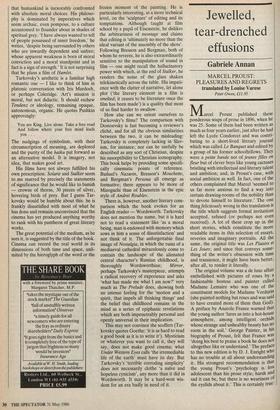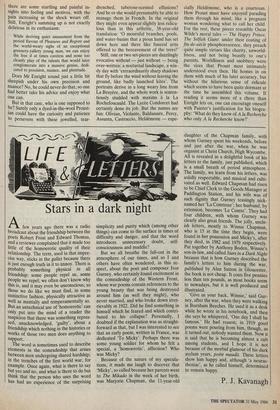Jewelled, tear-drenched effusions
Gabriele Annan
MARCEL PROUST: PLEASURES AND REGRETS translated by Louise Varese
Peter Owen, f11.95
Marcel Proust published these ponderous wisps of prose in 1896, when he was 25. Some of them had been written as much as four years earlier, just after he had left the Lycee Condorcet and was contri- buting to a short-lived literary journal which was called Le Banquet and edited by a group of his former schoolfellows. They were a petite bande not of jeunes flues en fleur but of clever boys like young cactuses bristling with intellectual and literary talent and ambition; and, in Proust's case, with social ambition as well. In fact, one of the others complained that Marcel 'seemed to us far more anxious to find a way into certain drawing-rooms of the nobility than to devote himself to literature.' The one thing felicitously wrong in this translation is the title which suggests formal invitations accepted, refused (or perhaps not even received). A lot of these crop up in the short stories, which constitute the more readable items in this selection of essays, reveries and imaginary portraits. All the same, the original title was Les Plaisirs et Les Jours; and since that conveys some- thing of the writer's obsession with time and transience, it might have been better, after all, to render it literally. The original volume was a de luxe affair embellished with pictures of roses by a fashionable hostess and painter called Madame Lemaire who was one of the constituent models for Madame Verdurill (she painted nothing but roses and was said to have created more of them than God). A preface by Anatole France warned that the young author 'lures us into a hot-house atmosphere, among intelligent orchids whose strange and unhealthy beauty has no roots in the soil.' George Painter, in his biography of Proust, felt that France was `doing his best to praise a book he does not altogether like or understand.' The preface to this new edition is by D. J. Enright who has no trouble at all about understanding it. His strongest recommendation is that the young Proust's 'psychology is less adolescent than his prose style; harsh and sad it can be, but there is no weariness of the eyelids about it.' This is certainly true: there are some startling and painful in- sights into feeling and motives, with the pain increasing as the shock wears off. Still, Enright's summing up is not exactly delirious in its enthusiasm:
While deriving quiet amusement from the period flavour of Pleasures and Regrets and the world-weary sighs of an exceptional greenery-yallery young man, we can enjoy the free if at times careless and none too cleanly play of the talents that would later conglomerate into a massive genius, dedi- cated to precision, nuance, and plenitude.
Does Mr Enright sound just a little bit sheepish under his own precision and nuance? No, he could never do that; so one had better take his advice and enjoy what one can.
But in that case, who is one supposed to be? Surely only a dyed-in-the-wool Proust- ian could have the curiosity and patience to persevere with these jewelled, tear- drenched, tuberose-scented effusions? And he or she would presumably be able to manage them in French. In the original they might even appear slightly less ridicu- lous than in this arthritic, 38-year-old translation: '0 mournful branches, pools, and water-basins that a pious hand has set down here and there like funeral urns offered to the bereavement of the trees!'
Still, one or two set-pieces are dazzlingly evocative without — just without — being over-written: a nocturnal landscape, a win- dy day with `extraordinarily sharp shadows that fly before the wind without leaving the ground, like badly launched kites'. The portraits derive in a long weary line from La Bruyere, and the whole work is senten- tiously studded with maxims a la La Rochefoucauld. The Lycee Condorcet had certainly done its job. But the names are fun: Olivian, Violante, Baldassare, Percy, Assunta, Castruccio, Heldemone — espe- cially Heldemone, who is a courtesan. How Proust must have enjoyed parading them through his mind, like a pregnant woman wondering what to call her child. For the rest, these pieces resemble Oscar Wilde's moral tales — The Happy Prince, The Selfish Giant: under their coating of fin-de-siecle phosphorescence, they preach quite simple virtues like charity, unworld- liness, and not being beastly to one's parents. Worldliness and snobbery were the vices that Proust most intimately understood even then. He homes in on them with much of his later accuracy, but without the hilarious sense of ridicule which seems to have been quite dormant at the time he assembled this volume. If reading it seems more of a chore than Enright lets on, one can encourage oneself with Painter's justification for his biogra- phy: 'What do they know of A la Recherche who only A la Recherche know?'



























































 Previous page
Previous page